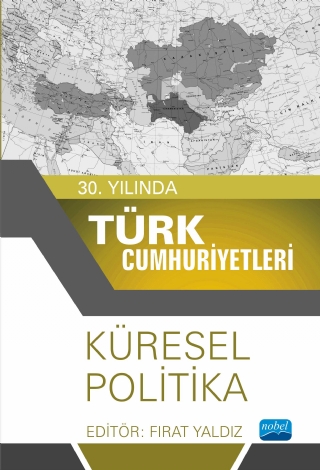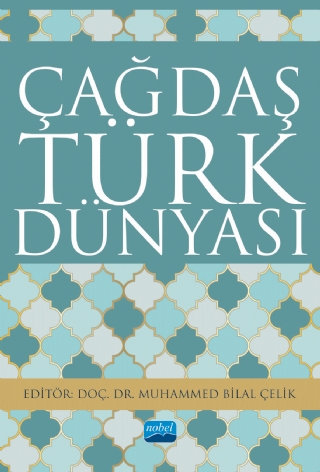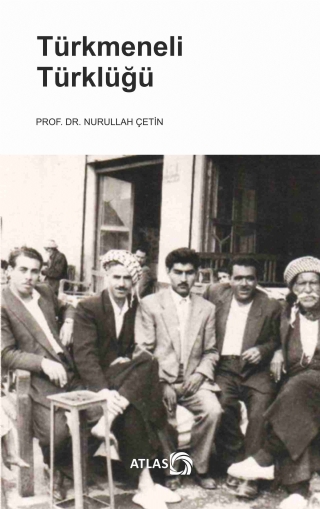General Turkish History \ 1-1

In the 30th Anniversary of their Independence, the Turkic Republics book series has emerged as a result of the valuable efforts of expert writers. In this three-book series, the 30-year journey of the Turkic Republics was analyzed thematically and holistically, not through states but over subjects. As a matter of fact, there was a need to analyze the Turkic Republics on a national, regional and global scale in terms of temporal and spatial context, both in Turkey and in Turkish. In this first book of the Turkish Republics in the 30th Anniversary of Independence book series titled National Politics; “National Identities and Social Structure”, “Understanding and Explaining the Transition, Change and Transformation Processes of Turkic Republics”, “Macro-Economic Structure and Sectoral Analysis of Turkic Republics”, “Migration from Past to Present in Relations between Turkey and Turkic Republics”, “Turkish There are "Religion in the Turkish Republics", "Media in the Turkic Republics" and "Tourism in the Turkic Republics" sections. With the Introduction and Conclusion sections of the book, National Policy gets a holistic framework.
The book series of Turkic Republics in the 30th Anniversary of their Independence is a contemporary contribution to the literature on the Turkic Republics… Arousing curiosity and excitement in young researchers, encouraging new studies… Contributing to the future of the Turkic Republics, their role in the global system, 50th and 100th anniversary in the hope…
The book series of Turkic Republics in the 30th Anniversary of their Independence is a contemporary contribution to the literature on the Turkic Republics… Arousing curiosity and excitement in young researchers, encouraging new studies… Contributing to the future of the Turkic Republics, their role in the global system, 50th and 100th anniversary in the hope…

The Turkish World has an important place in the world agenda as a reality that is of interest, needs to be taken into account and preserves its importance today as it was in the past. Being at the center of the world's transportation, energy and trade corridor, it has been in the focus of attention of global powers for a long time. During the 19th and 20th centuries, most of the communities and peoples that make up the Turkish World remained in captivity; even today, some of them still cannot lead an independent life, however, they protect their own identity by protecting their national and religious values. In this context, with this third book of our series, which reveals our 4000 years of Turkish history, titled "Contemporary Turkish World", we have visited Turkestan, Siberia, Idil-Ural, Crimea, Caucasus, Iran, the Balkans, the Middle East and Cyprus from the 1850s to 2020. As we examined the Turkish presence in Turkey, we also tried to reveal the policies of the countries that have a say in the world, as well as Turkey, towards the Turkish World and how they perceive this world.
Although the book was prepared especially for university students, it has become a book that can be used by those who are interested in the subject, who want to have basic knowledge and who want to learn about the approaches of world power centers towards the Turkish World. Hope it is useful…
Although the book was prepared especially for university students, it has become a book that can be used by those who are interested in the subject, who want to have basic knowledge and who want to learn about the approaches of world power centers towards the Turkish World. Hope it is useful…

Our first goal in preparing this voluminous work is to enable our new generations to meet with the creative thoughts of their grandfathers and fathers in the recent past; to enable them to see everything with their own eyes and think with their own minds, and to help them circulate their own ideas. In this regard, we will not first lease our minds to the West or borrow their minds and lie on it. Because not only they are thinking, we are thinking too, we are also making “production ideas”.
Today, Turkey is located in the "periphery", not the center that determines and determines the intellectual agenda in the world, and often acts in a peripheral situation depending on the agendas determined by the center.
Therefore, our second goal is to help pave the way for getting out of the periphery and being at the centre. At the same time, it is to help the revival of our civilization, which we belong to in history, as an alternative, and to contribute to our thought life in its rebuilding.
This book also aims to reveal that contemporary Turkish thought is strong enough to be showcased in the world thought arena. If the development of our intellectual life towards its “natural medium” continues, it is certain that Turkish thought will make a significant contribution to world thought by producing newer and more original ideas. Now, we should leave behind the period of self-evaluation according to the thoughts of Western thinkers, and aim at the level where they can evaluate their own thoughts by looking at our products of thought, as in the past. We must be aware of it, so that we can move on to the periods of producing more of our new and universal ideas.
Today, Turkey is located in the "periphery", not the center that determines and determines the intellectual agenda in the world, and often acts in a peripheral situation depending on the agendas determined by the center.
Therefore, our second goal is to help pave the way for getting out of the periphery and being at the centre. At the same time, it is to help the revival of our civilization, which we belong to in history, as an alternative, and to contribute to our thought life in its rebuilding.
This book also aims to reveal that contemporary Turkish thought is strong enough to be showcased in the world thought arena. If the development of our intellectual life towards its “natural medium” continues, it is certain that Turkish thought will make a significant contribution to world thought by producing newer and more original ideas. Now, we should leave behind the period of self-evaluation according to the thoughts of Western thinkers, and aim at the level where they can evaluate their own thoughts by looking at our products of thought, as in the past. We must be aware of it, so that we can move on to the periods of producing more of our new and universal ideas.

This book, in which we try to deal with Turkish History and Culture in a wide range from about 2500 BC to the beginning of the 20th century, is prepared for both undergraduate students and those who are interested in the subject and want to acquire basic information. . From the origin and first living areas of the Turks to the first state they established in history, from their meeting with Islam to the first Muslim Turkish states, from the Turkish presence in Anatolia to the Ottoman Empire that ruled three continents, the turning points of Turkish history and the state organization and cultural life of these political structures, the expert in the field. You will read from the pen of the teachers…

Iraq and Syria were formerly Turkish homelands. Iraqi and Syrian Turkmen are a continuation and relative of the Turks of Turkey. Turks in Turkmeneli, which is the name of the ancient Turkish homelands in Iraq and Syria today, are in danger of extinction under the persecution of ISIS and Barzani peshmerga. Today, Turkish villages and cities in Turkmeneli are evacuated and occupied by ISIS and the peshmerga. Turkey must protect the Iraqi and Syrian Turkmen in order to preserve its existence.